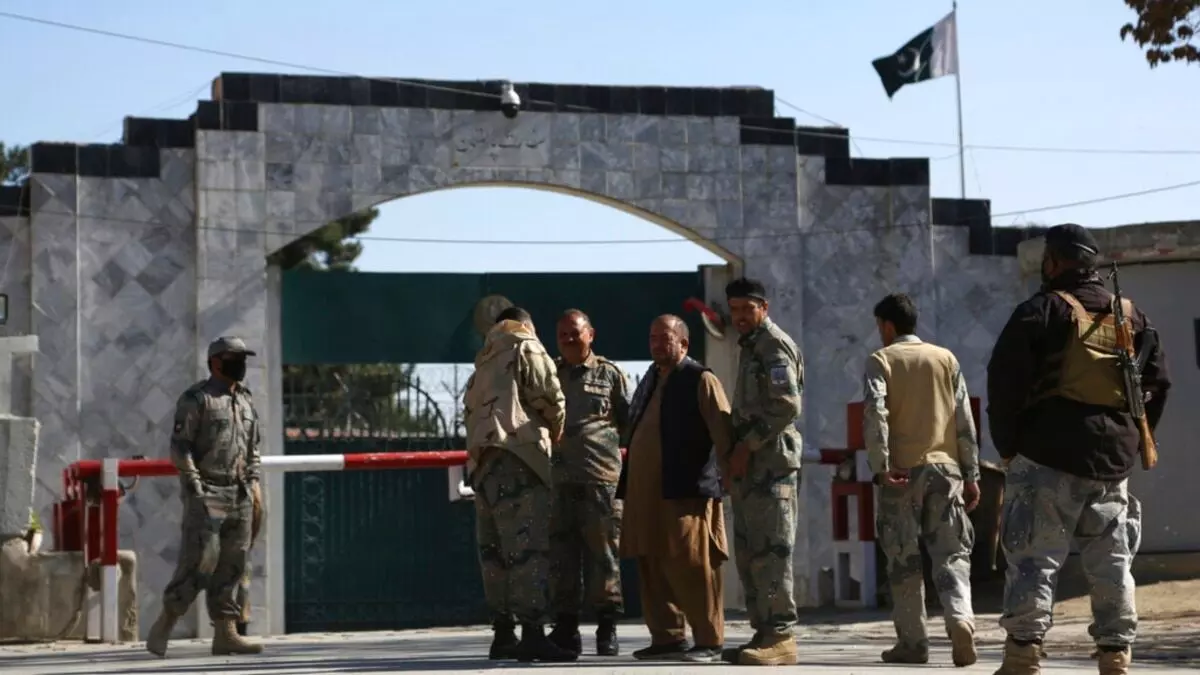Bleak outlook
Against the backdrop of deteriorating Afghan-Pak relations, the Taliban government is failing badly to put a tab on increasing terror incidents in Afghanistan

It is nearly 16 months today since the Taliban took the reins in Afghanistan and after the exit of US and allied forces from Afghan soil, people had thought the Taliban would be able to at least control the 'Jihadi' elements but all were proved wrong. There had been a systematic pattern since August 15 last year, of terror killings at regular intervals which not even spared the women, children or Shia/Hazara minority in Afghanistan. In brief, the Taliban-led government failed miserably in maintaining law and order or control of terror attacks including in places of worship.
While the Taliban blamed Al Qaeda or the IS for carrying out the terror acts, the Afghan Taliban is blamed by many for the terror violence and all these terror groups are well beyond the intelligence and security agencies' radar. Not so long ago, some noted security analysts even blamed a section of the Pakistani intelligence agencies for sponsoring terror in various parts of Afghanistan amid credible reports of worsening bilateral ties between Pakistan and Afghanistan.
Meanwhile, on December 2, there was a well-planned terror attack on the Pakistani Embassy in Kabul. The Afghan authorities claimed that the attacker, who is identified as a foreign national, is an active member of ISIS and was suspected to be complicit with the renegades. The Afghan Taliban on its part, claims that a foreign hand was involved in the daring attack on the Pakistani diplomatic mission. Last week, there were shots fired at the Pakistan embassy in the Afghan capital, in what Prime Minister Shehbaz Sharif described as an assassination attempt on the Head of the Mission, Ubaidur Rehman Nizamani. The Foreign Office in Islamabad revealed that the attack was aimed at Nizamani. A Pakistani security guard was critically wounded while protecting the Ambassador. The guard had since been evacuated to Pakistan.
In the meantime, the Ministry of Foreign Affairs (MoFA) has said that it is in the process of verifying the veracity of claims that Islamic State Khorasan Province (IS-KP) accepted the responsibility for attacking the Pakistan embassy in Kabul. In a related development, in a statement cited by 'jihadist' monitor SITE, the Islamic State's regional chapter said it had attacked the Pakistani Ambassador and his guards. It was earlier reported that the accused had planted landmines in three rooms of the building. Apart from one long-range rifle, 47 rifles, sniper and other arms and ammunition were also recovered from the accused.
Experts, meanwhile, analyze that there could be no greater sign of the simmering conflict between the two countries than the general tension despite an official denunciation from the Taliban’s foreign ministry. The security situation is heading south way faster than the wildest imaginations of Islamabad. Observers assess that last year’s takeover of Afghanistan was welcomed by Pakistan amid hopes for a collaboration to finally push the proverbial genie of terrorism back into the bottle. Since then, all attempts to remind the Taliban about their share of the bargain have been falling on deaf ears. Recently, Minister of State for Foreign Affairs, Hina Rabbani Khar met her Afghan counterpart to discuss the increasing spate of violence in the wake of a cancelled truce by the Pakistani Taliban. It did not yield any results. Judging by these developments, it would seem that the Afghanistan security scene has hit its nadir.
Pakistan watchers say that while the change in command of the military leadership and the subsequent return to normalcy is well-appreciated, it is still not strong enough of a message to weaken the resolve of those who wish to harm Pakistan. As the dust refuses to settle in Afghanistan on the security front, around 15 students of a Madrasa died in a terror blast in Aybak on November 30. Aybak is a small but ancient provincial capital that came to prominence as a caravan-stopping post for traders during the fourth and fifth centuries when it was also an important Buddhist centre. Authoritative sources feel the attack was meant to spread fear. But the country has witnessed several deadly attacks in the past 15 months under Taliban rule. At least 60 people were killed after a blast hit a mosque in the northern Kunduz province last October. Days later, a mosque was targeted in Kandahar province. At least 65 people were killed in that attack. In April, six people were killed after an explosion hit a secondary school in the capital Kabul. In the same month, at least 31 people were killed in an ISIL attack in Balkh province. A suicide bomber targeted female students in Kabul in September killing more than 50 people, many of them students.
Reacting to the Madrasa incident, a Kabul University opined that the blast was aimed at destabilizing the country and is a challenge to the Taliban’s hopes of bringing security to Afghanistan. This could, however, be far-fetched. He further said that the religious schools are also strongholds of Taliban leadership at the provincial level. They are affiliated with the local Taliban governor or police chief. So, the attack on the Madrasa is perhaps a way to challenge the Taliban’s control over security.
These incidents of terror attacks have exhibited that
• There is a lack of resolve on part of the Afghanistan government to tackle the IS or Al Qaeda;
• The intelligence machinery lies in complete inertia;
• The US is possibly not sharing actionable intelligence inputs; and
• Things would further deteriorate rapidly.
On the whole, the security scene in Kabul continues to be grim with no prospects at all of improving in the near or distant future.
The writer is a retired IPS officer, a security analyst and a former National Security Advisor to the PM of Mauritius. Views expressed are personal



